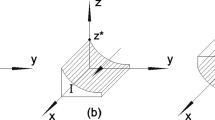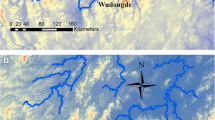Abstract
The PPP mode of rural water environment governance was conducive to attracting social capital for giving full play to the decisive role of the market in resource allocation, coordinating the interests of all parties, and relieving the government budget pressure and debt burden. The cooperation strategy of rural water environment governance PPP projects was analyzed from the perspective of evolutionary game, and dynamic process between project company and farmers was elaborated. First, evolutionary game theory was applied to study the cooperation strategy selection between stakeholders, i.e., the project company and farmers in PPP mode of rural water environment governance project, and evolutionary game model and duplicate dynamic equation were presented for cooperation with project company and farmers, and evolutionary path was obtained. Then four parameters with discount rate of water charges, incentive rate, plant income increasing rate, contribution rate of farmers on the choice of cooperation strategies were simulated. It was indicated that effort strategy of project company and participation strategy of farmers were interrelated from perspective of evolutionary game, and effort strategy of project company was improved discount rate of water charges, incentive rate and plant income increasing rate of farmers, and participation enthusiasm of farmers was improved; thus, engineering quality and efficient operation were assured. As a result, the evolutionary path of cooperation strategy between project company and farmers was suggested as effort strategy and participation strategy, respectively, and corresponding measures of company and participation style of farmers were adopted for promoting the formation of the final equilibrium state.










Similar content being viewed by others
References
An, X., Li, H., Wang, L., et al. (2018). Compensation mechanism for urban water environment treatment PPP Project in China (in Chinese). Journal of Cleaner Production, 201(PT.1-1166), 246–253.
Chen, Z. R., Feng, J. C., Wang, Y. T., & Xue, S. (2017). PPP mode’s applications motivation in the field of water conservancy project - based on the “money service” theory of Milton Friedman. IOP Conference Series: Earth and Environmental Science, 69(1), 1500–1503.
Du, Y. Q., Su, S. P., & Sun, X. X. (2015). A Non Cooperative Game Equilibrium analysis of rural water environment governance(in Chinese). Resource development and market, 31(3), 321–326.
Hong, K. R., & Dai, J. B. (2020). PPP mode of shantytown reconstruction: study on evolutionary game theory(in Chinese). Mathematics in Practice and Theory, 50(4), 102–111.
House, S. (2016). Responsive regulation for water PPP: Balancing commitment and adaptability in the face of uncertainty. Policy & Society, 35, 179–191.
Jia, K., & Sun, J. (2006). Application of PPP mode in new rural infrastructure construction(in Chinese). Local Finance Research., 05, 4–7.
Jia, X. M., Yu, Q., Wang, W. Y., et al. (2020). Considerations for rural domestic sewage treatment during the 14th Five-Year Plan (in Chinese). Journal of Agricultural Resources and Environment, 37(5), 623–626.
Kong, X. Z., Li, S. J., & Ma, J. J. (2006). Research on supply status of rural public goods and paying willingness of farmers(in Chinese). Zhongzhou Journal, 04, 54–58.
Li, Z. K., Yang, J. H., Wu, J. D., et al. (2007). Approach to the effect from enriching-people water conservancy engineering on the sustainable development in mountainous area of Beijing (in Chinese). Journal of Research of Soil and Water Conservation., 14(3), 226–230.
Li, X. Y., Luo, L., & Wang, Y. J. (2019). Implementation status, problems and suggestions for PPP mode of water conservancy projects (in Chinese). Journal of Economics of Water Resources, 37(5), 27–30.
Lin, Y. C., & Zhu, C. D. (2020). Journey of river ecological management in China(in Chinese). China Flood & Drought Management, 30(11), 73–76.
Luo, S. (2014). Based on satisfaction degree of farmers of small irrigation and water conservancy investment performance evaluation (in Chinese) (pp. 26–34). Changsha: Hunan Agricultural University.
Mai, Z. (2018). Dayu water-saving: secret of leading PPP in agriculture (in Chinese). Nongjing, 03, 70–73.
Nan, H. E. (2013). PPP mode of rural water project: application and analysis(in Chinese). Journal of North China Institute of Water Conservancy and Hydroelectric Power (Social sciences Edition)., 01, 54–57.
Smith, J. M., & Price, G. R. (1973). The Logic of Animal Conflict., 246(5427), 15–18.
Shao, J. B. (2008). Research on corporation transformation of collective economic organizations in the process of rural urbanization (in Chinese) (pp. 1–51). Lanzhou: Lanzhou University.
Tian, J. H., Wu, Y. D., & Zeng, W. (2018). The Mode of Cooperation Between Local Governments and Social Organizations in China’s River Environment Governance and Its Problems and Countermeasures (in Chinese). Chinese Public Administration., 401(11), 62–67.
Wang, C. F. (2008). Research on PPP mode of rural infrastructure governance(in Chinese). Agricultural Economy, 2008(06), 64–67.
Wang, H. B. (2014). Research on problems and countermeasures for urbanization of reservoir resettlement in Guizhou Province. Advanced Materials Research, 1065–1069, 629–633.
Wang, C. (2017a). Analysis on operational management mechanism of farmland water conservancy facilities in Luliang county Yunnan Province (in Chinese). China Water Conservancy, 2017(17), 59–61.
Wang, Y. N. (2017b). Preliminary thinking on introduction of PPP mode in rural water environment governance (in Chinese). Water Conservancy Development Research, 17(11), 69–71.
Wang, R. M. (2020). Research on strategy of promoting implementation of PPP mode for government and social capital (in Chinese). Reform and Opening, 17, 16–18+26.
Wang, J. N., Zhao X. T., Cai N., et al. (2020). Pollution discharge and environmental treatment efficiency of rural domestic sewage in China (in Chinese). Research of Environmental Sciences, 33(12), 2665–2674.
Wen, F. A. (2020). Modernization of rural ecological governance: importance, governance experience and development approach in the new era (in Chinese). Theory Journal, 289(3), 67–76.
Wu, H. W. (2012). Development strategy on systematic design of water-saving projects in key medium-sized irrigation areas in china (in Chinese) (pp. 65–69). Hefei: Chinese Academy of Agricultural Sciences.
Wu, D., Zhang, W. W., Wang, Y. N., et al. (2018). Investment and financing mode and experience enlightenment of rural water environment treatment in typical areas (in Chinese). China Water Resource, 11, 61–64.
Xu, L. Y., Du, J. G., & Wang, W. L. (2017). Evolutionary game analysis on rural water environmental governance(in Chinese). China population resources and environment, 27(5), 17–26.
Yan, H. D., & Feng, J. C. (2020). Application scope, transaction design and policy suggestions of PPP mode in China’s agricultural and rural areas under the background of rural revitalization (in Chinese). Rural Economy, 02, 14–23.
Yang, W. B., Feng, J. C., & Zhang, K. (2015). Study on willingness to pay and influencing factors of rural residents for water environment treatment (in Chinese). Journal of Zhongnan University of Economic and law., 211(4), 58–65.
Acknowledgements
We are grateful to the financial support provided by National Social Science Foundation of China (No. 15CJL023) and National Science Foundation of China (No. 2019B19614).
Author information
Authors and Affiliations
Corresponding author
Additional information
Publisher's Note
Springer Nature remains neutral with regard to jurisdictional claims in published maps and institutional affiliations.
Rights and permissions
About this article
Cite this article
Feng, J., Tang, Y., Xue, S. et al. Study on cooperative strategies of rural water environment governance PPP project between companies and farmers from the perspective of evolutionary game. Environ Dev Sustain 24, 138–155 (2022). https://doi.org/10.1007/s10668-020-01148-4
Received:
Accepted:
Published:
Issue Date:
DOI: https://doi.org/10.1007/s10668-020-01148-4




